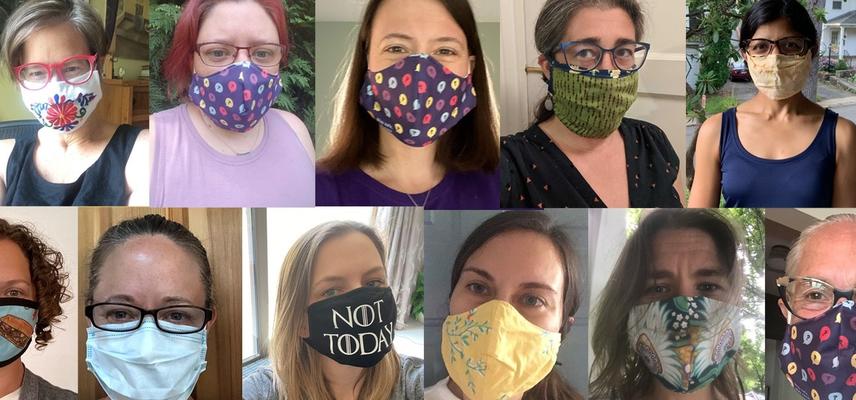Data driven policy interventions during the COVID-19 pandemic
The Leverhulme Centre for Demographic Science (LCDS) is at the forefront of COVID-19-related research.
In particular, the Centre studies age-specific patterns of COVID-19 mortality and excess mortality; ‘hotspots’ of infection and healthcare supply; support bubble formation; face coverings; and vaccine deployment.
This research has shaped policy-making at the highest level in response to the pandemic, both in the UK and abroad.
Formed in October 2019 under the leadership of Professor Melinda Mills, the Centre applies empirical approaches to providing evidence-based policy. It was therefore positioned perfectly to provide rapid scientific evidence and policy advice as COVID-19 spread.
Studies led by Professor Mills revealed that face coverings are effective in reducing source virus transmission; that socio-behavioural and cultural factors are vital to understanding public adherence to wearing face coverings, and therefore, consistent and effective public messaging is vital to public compliance; and that face coverings should not be seen as a solution in isolation, but as part of a ‘policy package’ of measures, including hand hygiene, social distancing and social bubbles.
This research led directly to the adoption of mandatory face coverings in indoor public spaces in England from July 2020.
Further research included recommendations for vaccine roll-out, including suggestions that the roll-out should move beyond mortality and age-based cohorts to prioritise non-health care occupations experiencing the highest levels of infection and death. It also stressed the importance of communicating a clear and transparent rationale for the roll-out.
This research influenced government communication initiatives regarding vaccine deployment, leading to the implementation of local, targeted communications plans.
Research by the LCDS on the effectiveness of social bubbles also influenced domestic policy and international practice, leading the UK government to advise people living alone to form a ‘support bubble’ with one other household from June 2020.
An online ‘Corona Hotspots Dashboard’ was also launched in March 2020, which combined census information and hospital capacity data for England and Wales to provide estimates of expected hospitalisations and hospital burdens within different areas.
The research garnered international press attention and helped frame public discourse on COVID-19 policies, action and protective measures. Research was also widely disseminated through the Dear Pandemic initiative, run by a group of female academics, of which Professor Jennifer Beam Dowd is a co-founder.
In recognition of their contribution, Professor Melinda Mills, Professor Jennifer Beam Dowd and team, were named as Winners of the O²RB Excellence in Impact Awards 2021 for their outstanding and diverse data-driven policy interventions during the COVID-19 pandemic.
Watch the film below to learn more about their impact journey in the face of the global pandemic:
https://www.youtube.com/embed/zo5RUdSYJwM
In April 2022, Professor Mills was appointed as one of three Special Advisors to Paolo Gentiloni, the European Commissioner of the Economy.
In this role, Professor Mills co-authored a report which reiterates that the COVID-19 pandemic has been an exceptional exogenous shock, accelerating digitalisation, forcing a re-evaluation of ways of working and living, but also exposing inequalities, gaps in skills, the vulnerability of certain industries and economies, and dependence on supply chains.
The report showed how the European Union could recover from the pandemic but also acknowledged the different starting points and responses across Europe during COVID-19.
Speaking at the European Parliament’s Special Committee on COVID-19 pandemic in November 2022, Professor Mills noted that many countries with supposedly the highest pandemic preparedness had the highest levels of death per 100,000 population. She advised:
We need to stop and think about pandemic preparedness. The COVID-19 pandemic is our wake up call. Now is the time to redirect resources, counter inequalities, and improve data and policies so that we do not sleep walk into the next crisis.
The LCDS continues to produce research on the impacts of COVID-19 on race and ethnic differences in mortality, as well as the impact on life expectancy, noting that in many countries, life expectancy as of 2022 had still not recovered from the pandemic.
-
Mills, M. C., R. C. Rahal, E. T. Akimova, ‘Face Masks and Coverings for the General Public: Behavioural Knowledge, Effectiveness of Cloth Coverings and Public Messaging.’ SET-C Report, The Royal Society and British Academy (26 June 2020)
-
Mills, M. C., R. C. Rahal, D. M. Brazel, ‘COVID-19 Vaccine Deployment: Behaviour, ethics, misinformation and policy strategies.’ SET-C Report, The Royal Society and British Academy (21 October 2020)





